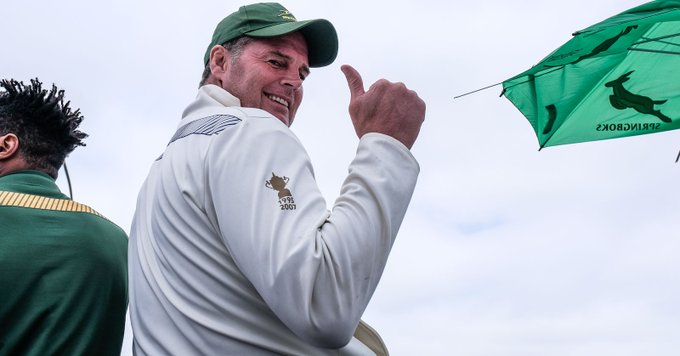Former Springbok coach Nick Mallett has heaped praise on Rassie Erasmus for his attention to detail, emotional intelligence and contributions to rugby in South Africa.
READ: URC to lay a path for new Club World Cup
Mallett, who coached South Africa to a record-equalling 17 victories in a row between 1997 and 1998, is himself regarded as one of South Africa’s greatest coaches.
Speaking to The XV, Mallett gave insight into what made Erasmus such a special player and, later, coach.
‘He was just very clever and maximised what talent he had. Somehow he got to the ball quicker than anyone else. It wasn’t because he was the fastest; it was down to his anticipation.
‘He’s the first player I know of who asked the coaches for clips of the opposition. He wanted to do his own analysis, to identify the threats and the possible opportunities.’
One moment during the 2000 Tri-Nations stands out to illustrate Erasmus’ analytical ability. He had identified that off exit plays, Australia – then the best team in the world – would always play the ball from George Gregan behind a dummy runner to either Stephen Larkham or Chris Latham.
‘Rassie was set to mark Kefu in that instance. He proposed, however, that he go for the intercept instead. And, on the day, he did exactly that. Gregan threw the ball behind Kefu’s back, and Rassie picked it off. He ran 20 metres and dived over the line. That piece of analysis and execution by Rassie has always stuck with me.’
Erasmus’ playing career was curtailed by injury but his transition to coaching was natural, and it was of little surprise that he saw early success winning the Currie Cup twice with the Cheetahs in his first three years of coaching.
‘His attention for detail was incredible during his stints at the Cheetahs and the Stormers. He’d crack the lineout calls of every opposition team. He prepared his charges for every eventuality. That wasn’t a coach looking to control his players but empower them through knowledge.’
When Rassie was brought into SA Rugby’s structures his impact was immediate, according to Mallett.
‘He did so much for rugby in South Africa. He put an identification programme into place to monitor players from U16 level upwards. That was so important in identifying and nurturing black players and helping SA Rugby to realise their transformation goals at the higher levels.’
Before becoming Springbok director of rugby, Erasmus did a coaching stint in Ireland. Mallett feels that his time spent at Munster was formative in developing the coach and man who Erasmus is today.
‘Moving to Ireland was a big step in his personal development as well as his rugby education. He worked alongside Axel Foley and, when Foley tragically passed away, the fallout in that tight-knit Munster community was massive.
‘The players were hurting after losing such an inspirational figure. The way Rassie responded in that situation was nothing short of fantastic. It was a big emotional test. He then took on the job of head coach and did an admirable job.
‘He’d always had the technical and tactical coaching gifts. When he came back, however, he had the emotional intelligence to complement those strengths. That’s what the stint at Munster gave to him.’
Mallett feels that this emotional intelligence is also what drove Erasmus to tackle the subject of transformation head-on with transparency and integrity. It is an approach that has reaped rewards and gone some distance in unifying the country.
‘He picked Siya Kolisi to lead the side and he picked the most transformed team [with six black players in the starting XV] in history to play England in the first Test of the series.
‘That was a statement, because it was a massively important game in the context of his career as a coach and he was effectively saying that this team were good enough to win it.’




